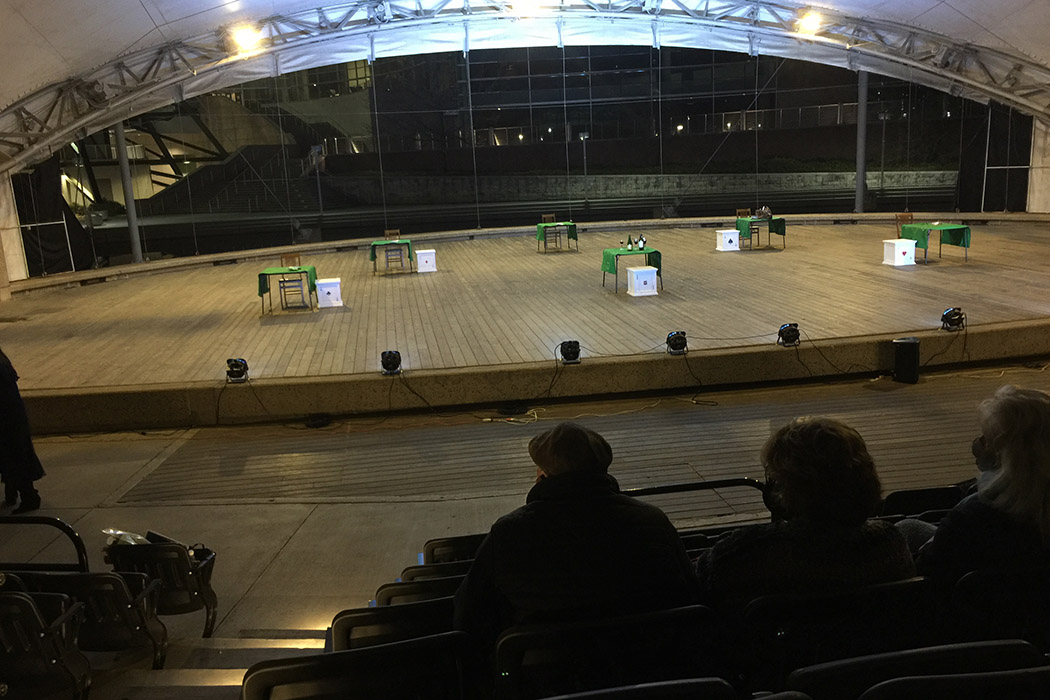Much will be written in the months and years to come describing the multiple layers of destruction that the Covid-19 pandemic has brought down onto our civilization. The anguish and heartbreak of the loss of life has been augmented by the realization that many surviving lives and livelihoods have either been reduced or irretrievably altered for the worse.
Many in the arts world have been shoved into the philosophical dilemma of how to survive the pandemic without abandoning hope that civilization’s arts underpinning can be maintained in the face of necessary pandemic safety restrictions. Nagging questions have arisen for arts organizations, like “should we shut down until ‘normal’ returns—and hope it does—or should we adapt and compromise our content and presentation to suit the moment and our funding?” To date, there has been no universal agreement on that issue. Technology has been a solution for some, allowing video or live-streaming of performing arts events, either with no live audience or a limited, socially-spaced one. Admittedly though, the acceptance and satisfaction level for viewing music concerts, opera, and theatre via streaming, even with excellent video and audio production, has been low.
Marble City Opera is one of those organizations that has embraced a technological and staging compromise in order to continue its work in Knoxville’s arts scene. Their latest production this last weekend, the world premiere of Frank Pesci’s Royal Flush, had four performances in front of a limited, socially-spaced audience in the open-air Tennessee Amphitheatre at World’s Fair Park, while also being live-streamed. Director Kathryn Frady double-cast the one-act, five character opera spread over the four performances, giving more singers performance opportunities during this time of employment deprivation. And, of course, operatic works with five significant female roles are few and far between.
Pesci’s comic, metaphorical premise is rather simple. Four “sisters” are dealt a hand of poker by their “mother”. With each card dealt, one of the sisters reflects on her situation in life and reveals the relationships that she has with the others. Rosie (Sarah-Clementine Mire/Ryan Colbert) resorts to off-color language in dealing with life, while CeeCee’s (Kayla Beard/Jacquie Brecheen) downfall is unconstrained light-heartedness. Frankie (Tori Franklin/Whitney Meyers), a performer, is obnoxiously over-confident, while Annie (Ashlee King/Jenna Ziccardi) has a problem controlling her violent temper. Mother (Sarah Klopfenstein/Aubrey Odle), on the other hand, is the consummate player, maintaining an even demeanor and a poker face throughout. By the end, as each sister has revealed their “losing” hand, Mother has assembled a “royal flush” identifying the issues and weaknesses of each sister.
Pesci’s charming and tuneful score is equally simple, balancing accessible melodic lines with some sophisticated ensemble work and a solid harmonic underpinning. Music director Brandon Coffer provided the energetic accompaniment via a single keyboard.
Not surprising, what worked against this nicely directed and well-performed production were the pandemic precaution compromises themselves. While the open Tennessee Amphitheatre stage offered a natural environmental spacial protection, that openness came with acoustics that often swallowed lyrics, even for the strongest of voices, creating a cloudy haze of sound that defied understanding. While some of the singers were able to cope with this better than others, it afflicted all at some point, particularly when upstage. With staging precaution standards in place, the singers were seated, not around a theatrical poker table as one might expect, but at separate tables 15 or so feet apart with the stage movement of the individual sisters designed to maintain that spacing. And then, there were the passing emergency vehicles…and the train—its horn drowning out arias at comically strategic moments—and with uncanny effectiveness.
Yes, Marble City Opera does deserve points for attempting Royal Flush under the burden of Covid-19 precautions. Needless to say, however, there is a point beyond which pandemic precautions, and the necessary compromises, render music and theatrical performance ineffective. The question becomes: was it worth it? Hopefully, we are approaching the time in which those compromises will not longer be necessary, and our discussions of performances will not have to beg forgiveness for face masks, temperature checks, and train horns. When that day comes, be sure to deal me in.






